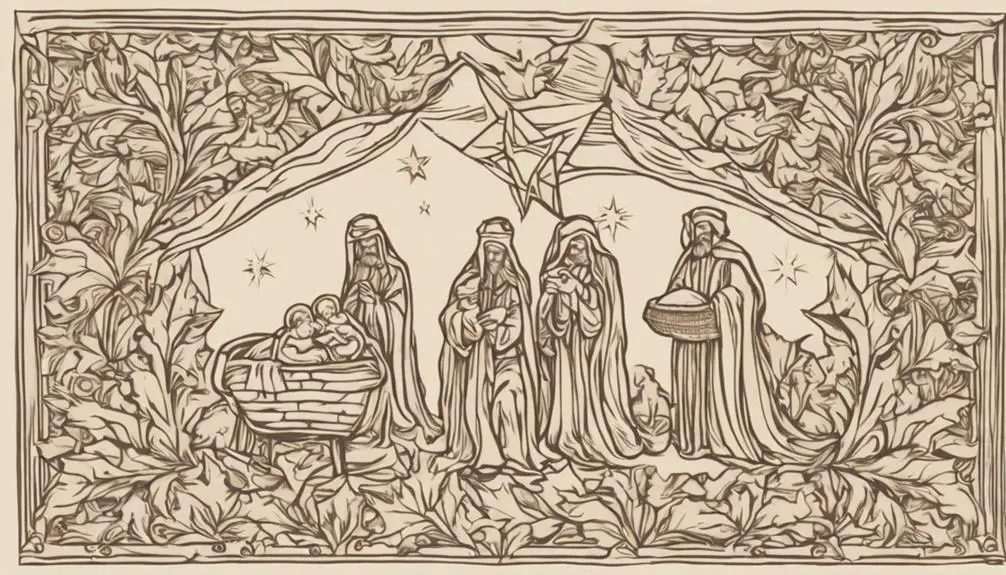Yearning to understand the true spirit of Christmas? Discover the profound wisdom hidden within a significant Bible verse, Isaiah 9:6.

A Bible Verse About Christmas
Imagine you're sifting through a mound of puzzle pieces on Christmas morning, each one unique yet part of a larger picture. This is very much like the exploration of Isaiah 9:6, a significant Bible verse associated with Christmas, 'For unto us a child is born, unto us a son is given…'
It's a phrase you've probably heard more times than you can count, yet its depth and symbolism may still hold unexplored territories for you. So, why don't we embark on a journey together to uncover the profound meanings hidden within this familiar verse?
Key Takeaways
- Isaiah 9:6, a prophetic verse, profoundly encapsulates the spiritual significance of Christmas, foretelling the birth of Jesus.
- The verse's symbolic titles – 'Wonderful Counselor', 'Mighty God', 'Everlasting Father', 'Prince of Peace' – represent various aspects of Jesus' divine nature.
- Modern Christmas celebrations can be enriched by reflecting on the profound meanings of these symbolic titles, fostering unity and peace.
- Christmas is ultimately a message of divine love, characterized by selflessness, sacrifice, and transformation, as conveyed through the birth of Christ.
The Biblical Origins of Christmas

Delving into the biblical origins of Christmas, you'll find that the celebration is rooted in the New Testament's accounts of the birth of Jesus Christ. Matthew and Luke provide the most detailed narratives, both focusing on different aspects of this remarkable event. Matthew underscores the fulfillment of Old Testament prophecies, centering on the visit of the Magi, while Luke, on the other hand, emphasizes the humble circumstances of Jesus' birth, particularly the involvement of shepherds.
Analyzing these accounts, you'll notice that the exact date of Christ's birth isn't stated. While December 25 is widely accepted, it's not biblically definitive. What's important, though, are the reasons behind the celebration. Christmas isn't merely about commemorating a birth date, but recognizing the profound theological implications of the Incarnation, God becoming man.
In essence, the biblical origins of Christmas are less about the precise historical details and more about the overarching narrative of God's redemptive plan. So, as you celebrate Christmas, remember that it's an affirmation of the Christian belief in the divine love that chose to dwell among mere mortals.
Understanding Isaiah 9:6

To fully grasp the Christmas message, you need to understand Isaiah 9:6, a prophetic verse that Christians believe foretells the coming of Jesus Christ. This verse, written hundreds of years before Christ's birth, is packed with nuances and rich in symbolism.
The verse reads: "For to us a child is born, to us a son is given, and the government will be on his shoulders. And he will be called Wonderful Counselor, Mighty God, Everlasting Father, Prince of Peace."
Isaiah 9:6 |
Interpretation |
|---|---|
Child is born |
The humanity of Christ |
Son is given |
The divinity of Christ |
Government on his shoulders |
Christ's authority |
Wonderful Counselor |
Christ's wisdom |
Prince of Peace |
Christ's mission |
Each phrase provides a glimpse into the character and mission of the prophesied Messiah. The 'child' denotes humanity, the 'son' suggests divinity, and the 'government' signifies authority. The titles—'Wonderful Counselor', 'Mighty God', 'Everlasting Father', and 'Prince of Peace'—further elaborate on the multifaceted nature of Christ's role. Understanding these elements is crucial to appreciating the depth of the Christmas message.
Symbolism in the Christmas Verse

Let's peel back the layers of symbolism in the Christmas verse, exploring how each element contributes to the profound spiritual message conveyed in this important biblical passage. In Isaiah 9:6, the prophecy of the Messiah's birth is replete with symbolic meaning. Each title given to the Savior – Wonderful Counselor, Mighty God, Everlasting Father, Prince of Peace – brings a unique layer of profound spiritual significance.
The title 'Wonderful Counselor' symbolizes Jesus as the divine guide, the source of wisdom, and the one who offers comfort and direction. 'Mighty God' underscores his divine nature and omnipotent power, emphasizing the belief in Jesus as God incarnate. The term 'Everlasting Father' speaks to his eternal existence and his paternal, protective role over humanity. Lastly, 'Prince of Peace' symbolizes the tranquility and reconciliation Jesus brings between humanity and God, embodying the essence of the Christmas message.
Each title, each term, is a symbol, a signpost, leading you deeper into the understanding of the Christmas verse. The symbols aren't just words; they're the keys to unlocking the profound spiritual truth found in this pivotal biblical passage.
Application in Modern Christmas Celebrations

In today's Christmas celebrations, these symbolic titles from Isaiah 9:6 are present, guiding us to reflect on their profound meanings and apply them to our lives. As 'Wonderful Counselor', you might find wisdom in the season's serenity, peace, and goodwill. Perhaps, amidst the hustle and bustle, you're reminded of God's counsel to love and serve others.
In the title 'Mighty God', there's an opportunity to recognize the grandeur of the divine birth celebrated at Christmas. You're challenged to see beyond the externalities of gift-giving and feasting, to the profound spiritual implications.
The 'Everlasting Father' invites you to reflect on the eternal nature of divine love. Amid the fleeting festivities, there's a call to appreciate God's unending care.
'Prince of Peace' can be seen in the aspiration for unity, reconciliation, and harmony during the season. It's a reminder that Christmas isn't just about personal joy, but also about fostering peace with those around us.
Thus, the titles from Isaiah 9:6 aren't merely ancient descriptors, but active, applicable concepts that permeate every aspect of our modern Christmas celebrations.
Unpacking the Message of Love

Delving deeper into the heart of Christmas, you'll discover a profound message of love encapsulated within the celebrations. This love, emanating from the biblical narrative, is not ordinary. It's a divine love, characterized by selflessness and sacrifice, as demonstrated by Christ's birth and eventual crucifixion.
To fully grasp this, let's analyze four aspects of divine love encapsulated in Christmas narratives:
Aspect |
Description |
|---|---|
Unconditional |
God's love is absolute, not based on our worthiness or actions. |
Sacrificial |
Demonstrated by Christ's birth in a manger and His eventual sacrifice on the cross. |
Transformative |
This love changes us, steering us towards grace, mercy, and forgiveness. |
Everlasting |
God's love is eternal, providing a sense of security and peace. |
Each aspect speaks to the depth of love within the Christmas narrative, challenging you to not only receive this love but also extend it to others. In essence, Christmas serves as a reminder of the transformative power of divine love. By understanding this, you're better equipped to embrace and share the true spirit of Christmas. This is the heart of the Christmas message – a profound love that calls us to love in return.
Conclusion
So, as you've learned, the true essence of Christmas, as expressed in Isaiah 9:6, is rooted in love, promise, and divine intervention.
It's not merely about festive celebrations, but about appreciating God's gift of love and salvation.
Keep this in mind as you celebrate Christmas, making sure to incorporate this profound message of love into your festivities.
After all, understanding and living out this verse's truth enriches your Christmas experience beyond measure.



Sign up